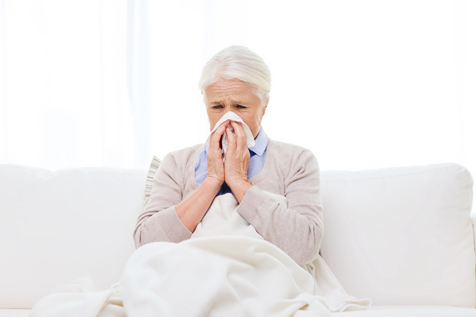Flu in seniors must be detected and treated before complications set in. Now that the rainy season has begun, it is also flu season, so it’s important to keep these things in mind.
Now that it’s the rainy season and the weather has become colder, not only does it signal the beginning of the holiday spirit. It also coincides with the beginning of the flu season.

While the flu may often be mistaken for the common cold because of similar symptoms such as sore throat, runny nose, and cough, leaving flu untreated can result in complications. Flu in seniors is especially risky when it comes to the elderly, when their bodies’s defenses aren’t the same as when they were younger.
What is the flu?
Flu is short for influenza, a respiratory disease caused by the influenza virus. It can start mildly or become severe to the point that it can cause hospitalization or even death.
It is a seasonal virus, and even preventable due to flu vaccines.
For seniors, since they have weaker immune systems, it may be harder for them to fight off the virus. When a flu infection worsens, it may lead to pneumonia and a range of other complications.
Symptoms of flu
The following are also the same symptoms of flu in seniors:
- runny nose
- congested nose
- sore throat
- coughing
- fever
- body aches
- fatigue
- headache
- chest discomfort
- chills
For those over 65, it is best for them to see the doctor right away to prevent the risk of complications.
Complications of flu in seniors
Some minor flu complications include ear or sinus infections.
More serious complications of flu, especially in the elderly, may include the following:
- bronchitis
- coughing up mucus (yellow, gray, or green)
- fatigue
- shortness of breath
- fever
- chest pains
- pneumonia
- chest pains
- shortness of breath
- severe cough
For seniors who catch pneumonia, their body temperature may go down. It may also result to confusion, nausea, and vomiting. Bacteria may also infect the bloodstream, causing a lung infection. This may also lead to lung abscess, fluid accumulation, and organ failure.
Other complications may include inflammation of other organs, such as the heart, brain, and muscles. If your elderly has asthma or heart disease, flu can further aggravate these conditions.
How to treat flu in seniors
There really is no cure for the flu, and the virus must run its course. What you can do is to just manage the symptoms. For example, you may take ibuprofen for fever and body pain.
Seniors must see a doctor within the first 48 hours following the presence of symptoms. If they are at high risk for complications, an antiviral treatment may be necessary.
Prevention is key
It is advisable to get a flu vaccine especially for seniors, to help prevent flu and the risk of complications.
Other ways to help the fight against the flu in seniors:
- Avoid crowded, high-traffic areas.
- Steer clear of sick people.
- Wear a face mask if going outside.
- Wash your hands regularly with warm, soapy water and use antibacterial gel throughout the day, especially when you’re touching doorknobs, etc.
- Don’t touch your face, mouth, or nose with your hands.
- Eat a healthy diet, exercise regularly, and get enough sleep.
- Regularly disinfect your home, especially the light switches, door knobs, telephones, etc.
- Visit the doctor immediately when you see signs of flu in elderly.
Recent Comments